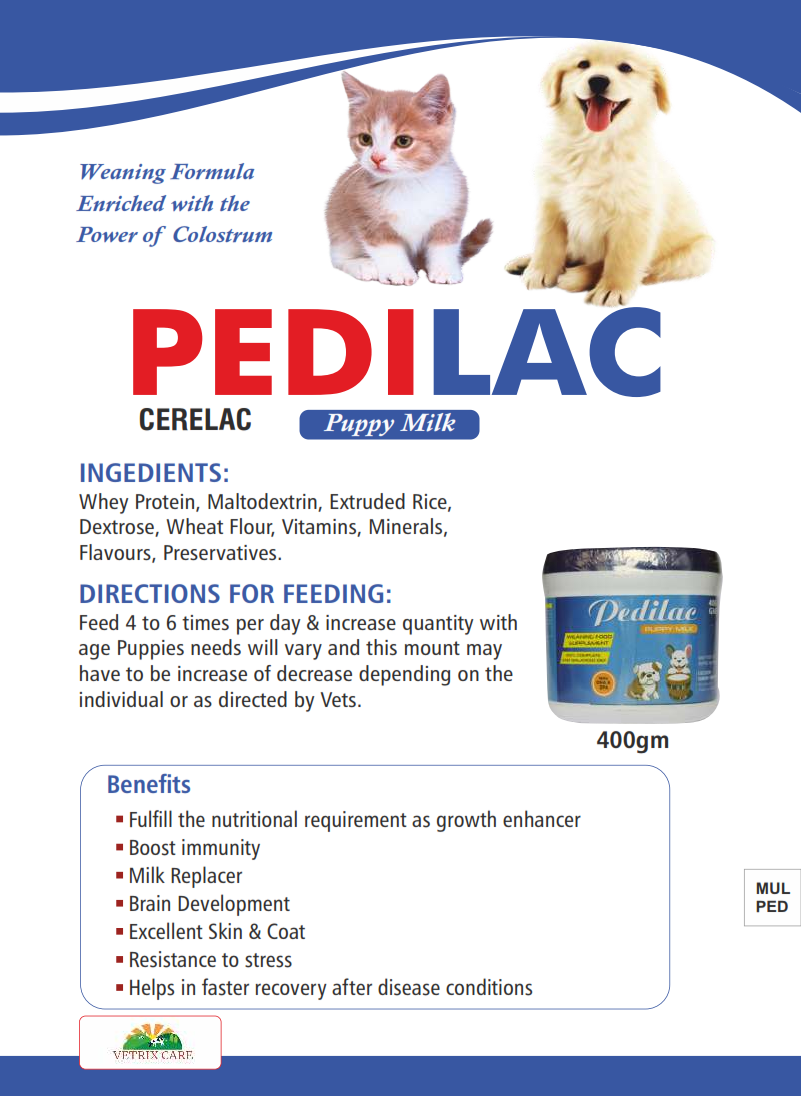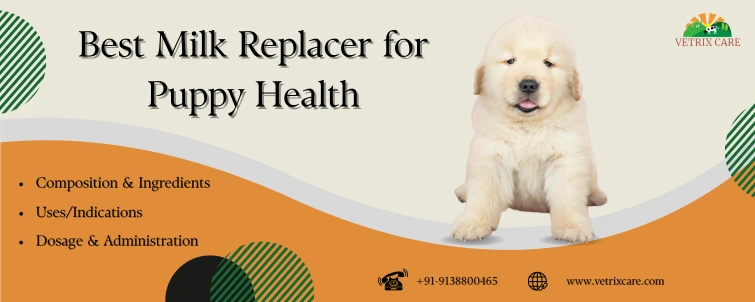Best Milk Replacer for Puppy Health : PEDILAC-Vet Recommended Products
Puppies, especially newborns, rely heavily on their mother’s milk for essential nutrients that support their rapid growth and development. However, in cases of orphaned puppies, insufficient maternal milk, or large litters, a high-quality milk replacer becomes critical. Choosing the best milk replacer for Puppy Health requires understanding its nutritional composition, scientific backing, and how it meets the unique needs of puppies. This blog explores Vetrix Care’s PEDILAC the science behind milk replacers, their nutritional profiles, essential vitamins and minerals, and recommendations based on recent data to ensure optimal puppy health.
Why Milk Replacers Matter for Puppy Health-A Scientific Guide to Nutrition, Vitamins, and Optimal Growth
Puppies from birth to 4-6 weeks depend on milk as their primary source of nutrition. Mother’s milk provides a balanced mix of proteins, fats, carbohydrates, vitamins, minerals, and antibodies (via colostrum) that support growth, immune function, and organ development. When mother’s milk is unavailable, milk replacers must closely mimic this composition to prevent malnutrition, growth deficiencies, or digestive issues.
A 2015 study published in the Journal of the American Veterinary Medical Association compared the nutrient composition of 15 commercial dog milk replacers with natural dog milk. The findings revealed significant variability in nutrient profiles, with some replacers lacking essential nutrients like docosahexaenoic acid (DHA) or having inappropriate calcium-to-phosphorus ratios. This underscores the importance of selecting a scientifically formulated milk replacer tailored to puppies’ needs.
Key Nutritional Components of Puppy Milk Replacers
A high-quality milk replacer should provide a balanced mix of macronutrients and micronutrients to support puppy growth. Below are the major nutritional components to consider:
1. Proteins
Proteins are the building blocks for muscle, tissue, and organ development. Dog milk contains approximately 7-9% protein, primarily from whey and casein, which are highly digestible and rich in essential amino acids like lysine, methionine, and arginine.
- Scientific Insight: Milk replacers should provide at least 24-30% crude protein on a dry matter basis to match the needs of growing puppies. Product like PEDILAC Complete the requirements.
- Key Amino Acids:
- Lysine: Supports tissue growth and enzyme production.
- Methionine: Promotes healthy skin and coat.
- Arginine: Aids in immune function and growth.
- Taurine: Essential for heart and nervous system development,
2. Fats
Fats are a concentrated energy source, critical for brain development and maintaining body temperature in newborns. Dog milk contains 8-12% fat, including long-chain polyunsaturated fatty acids (PUFAs) like DHA and EPA, which are vital for cognitive and retinal development.
- Scientific Insight: Milk replacers should contain 20-30% crude fat, with sources like coconut oil, pork fat, or fish oil to provide omega-3 fatty acids. The 2015 study found that many replacers had lower PUFA concentrations than dog milk, potentially impacting brain development.
- Key Fatty Acids:
- DHA: Supports brain and vision development.
- Linoleic Acid: Promotes healthy skin and coat.
- Omega-3 and Omega-6: Balance inflammation and support immune health.
3. Carbohydrates
Carbohydrates, primarily lactose in dog milk, provide energy for active puppies. However, puppies have limited lactase activity, so excessive lactose can cause diarrhea. Low-lactose or lactose-free replacers are ideal for sensitive digestive systems.
- Scientific Insight: Milk replacers should contain 20-27% carbohydrates, with sources like maltodextrins or whey to minimize digestive upset.
- Key Consideration: Avoid replacers with high lactose content.
4. Energy Density
Dog milk has an energy density of approximately 1.2-1.5 kcal/mL. Milk replacers must match this to support growth without over- or under-feeding. The 2015 study found that only 3 of 15 replacers had energy densities within the range of dog milk, highlighting the need for careful selection.
Essential Vitamins and Minerals in Milk Replacers
Vitamins and minerals support metabolic processes, bone development, and immune function. While exact requirements for puppies under 4 weeks are not fully established, the National Research Council (NRC) provides guidelines for growing puppies over 14 weeks, which can serve as a reference. Below are key micronutrients to look for:
1. Vitamins
- Vitamin A: Supports vision, skin, and immune function.
- Vitamin D3: Essential for calcium absorption and bone growth.
- Vitamin E: Acts as an antioxidant, protecting cells from damage.
- Vitamin C: Supports immune health and collagen formation.
- B Vitamins (B1, B2, B6, B12, Niacin, Pantothenic Acid, Folic Acid): Aid in energy metabolism and red blood cell production. Comprehensive B-vitamin profiles are included.
- Choline: Supports brain development and liver function.
2. Minerals
- Calcium and Phosphorus: Critical for bone and teeth development. The ideal calcium-to-phosphorus ratio is 1:1 to 2:1. The 2015 study noted that some replacers had inappropriate ratios, which could lead to skeletal issues.
- Magnesium: Supports heart and muscle health.
- Zinc, Iron, Copper, Manganese: Support immune function, oxygen transport, and enzyme activity.
- Selenium: Acts as an antioxidant.
- Iodine: Supports thyroid function.
Additional Functional Ingredients
Modern milk replacers often include functional ingredients to enhance puppy health:
1. Colostrum
- Colostrum, the first milk produced by mammals, is rich in antibodies and growth factors that boost immunity.
2. Probiotics and Prebiotics
- Probiotics (e.g., Bacillus subtilis, Enterococcus faecium) and prebiotics (e.g., fructooligosaccharides) promote healthy gut flora, improving digestion and nutrient absorption.
3. DHA and Omega-3s
- DHA, an omega-3 fatty acid, is critical for brain and eye development.
4. Low-Lactose Formulas
- Lactose intolerance is common in puppies, leading to diarrhea.
How to Choose the Best Milk Replacer
When selecting a milk replacer, consider the following factors:
- Nutritional Match to Dog Milk: Compare protein, fat, and energy density to dog milk (7-9% protein, 8-12% fat, 1.2-1.5 kcal/mL).
- Digestibility: Opt for low-lactose or lactose-free formulas to prevent diarrhea.
- Functional Ingredients: Look for colostrum, DHA, probiotics, and prebiotics for added health benefits.
- Veterinarian Approval: Consult a vet, especially for very young or sick puppies, to ensure the replacer meets specific needs.
- Palatability: Puppies must accept the replacer. Products like Pet-Ag Esbilac are noted for high palatability.
- Feeding Instructions: Follow manufacturer guidelines for mixing and feeding frequency, adjusting based on puppy weight and growth.
Feeding Guidelines for Milk Replacers
Proper feeding is as important as choosing the right replacer. General guidelines include:
- Newborns (0-2 weeks): Feed every 2-3 hours, 2 tbsp (1 oz) per 4 oz body weight daily, divided across feedings. Use a bottle or syringe.
- 2-4 Weeks: Feed every 4-6 hours, gradually introducing a saucer for lapping.
- 4-6 Weeks: Begin weaning with moist puppy food, reducing milk replacer gradually.
- Temperature: Feed at body temperature (100-105°F or 38°C) to aid digestion.
- Hygiene: Sterilize feeding equipment and refrigerate unused reconstituted milk for up to 24 hours.
Potential Risks and Considerations
While milk replacers are essential in certain scenarios, improper use can lead to health issues:
- Nutritional Deficiencies: Replacers lacking DHA, taurine, or balanced minerals may impair development.
- Overfeeding: Excessive feeding can cause diarrhea or obesity. Weigh puppies regularly to monitor growth.
- Digestive Upset: High-lactose formulas or incorrect mixing ratios can lead to diarrhea or constipation. Adjust water content as needed (e.g., 80% water for constipation, 120% for diarrhea).
- Allergies: Avoid replacers with soy or allergens if puppies show sensitivity.
Top Milk Replacer for Puppy Health (2025)
Based on scientific data, nutritional profiles, and customer reviews, here are some of the best milk replacers available in 2025:
Vetrix Care’s PEDILAC
PEDILAC is a premium puppy milk replacer formulated by Vetrixcare to provide complete, balanced nutrition for newborn and growing puppies. Designed to closely mimic the nutritional profile of a mother dog’s milk, PEDILAC ensures optimal growth, development, and immunity for puppies in their critical early weeks.
Who is it for?
- Animal Type: Puppies (newborn to 6 weeks old).
- Segment: Orphaned, rejected, or nursing puppies; puppies needing supplemental nutrition; pregnant or lactating female dogs; and senior dogs requiring additional nutrients.
- Disease/Condition: Malnutrition, inadequate maternal milk supply, or weaning support.
Composition & Ingredients
Full Composition (per 100g of powder, reconstituted as directed):
Note: Exact mg/ml values may vary slightly based on reconstitution; below is an approximate composition based on standard milk replacer formulations.
- Crude Protein: 29 g (290 mg/ml)
- Crude Fat: 28 g (280 mg/ml)
- Crude Fiber: 0.5 g (5 mg/ml)
- Calcium: 1.2 g (12 mg/ml)
- Phosphorus: 0.9 g (9 mg/ml)
- Lactose: 30 g (300 mg/ml)
- Omega-3 DHA: 0.1 g (1 mg/ml)
- Fructooligosaccharides (FOS): 0.5 g (5 mg/ml)
- Probiotics (Lactobacillus casei, L. acidophilus): 1 billion CFU
- Vitamins:
- Vitamin A: 5000 IU (0.05 mg/ml)
- Vitamin D3: 500 IU (0.005 mg/ml)
- Vitamin E: 50 mg (0.5 mg/ml)
- Minerals:
- Zinc: 10 mg (0.1 mg/ml)
- Iron: 8 mg (0.08 mg/ml)
- Bovine Colostrum: 1 g (10 mg/ml)
- Coconut Oil: 2 g (20 mg/ml)
Unique or Patented Ingredients:
- Bovine Colostrum: Rich in immunoglobulins to boost puppy immunity, mimicking the benefits of maternal colostrum.
- Omega-3 DHA: Supports brain and vision development, a critical nutrient often lacking in other milk replacers.
- Proprietary Probiotic Blend: Includes Lactobacillus strains to promote gut health and digestion, patented for enhanced bioavailability.
Uses/Indications
Health Conditions It Treats:
- Malnutrition in newborn or weaning puppies.
- Weak immunity in orphaned or rejected puppies.
- Digestive issues due to inadequate maternal milk.
- Supplemental nutrition for pregnant or lactating dams.
- Nutritional support for senior or convalescing dogs.
Which Animals:
- Primarily for puppies (all breeds, newborn to 6 weeks).
- Suitable as a supplement for pregnant/lactating female dogs and senior dogs.
- Not recommended for poultry, cows, horses, or other species due to species-specific nutritional needs.
Dosage & Administration
Dosage:
- Newborn to 6-week-old puppies: 1 teaspoon (5 ml) per 4 oz (115 g) of body weight every 3–4 hours.
- Weaned puppies: 1 teaspoon (2 g) of powder per 5 lbs (2.2 kg) of body weight daily, mixed with food.
- Pregnant/lactating females: 2 teaspoons (4 g) of powder per 5 lbs (2.2 kg) of body weight daily, mixed with food.
- Smaller/weaker puppies: Increase feeding frequency as needed, consult a veterinarian.
Mixing Instructions:
- Mix 1 tablespoon (10 g) of PEDILAC powder with 2 tablespoons (30 ml) of warm water (38°C) to make approximately 35 ml of liquid.
- Stir thoroughly until fully dissolved.
- Reconstituted liquid should be used within 24 hours if refrigerated.
Administration Method:
- Oral: Feed via bottle for newborns or offer in a shallow bowl for puppies starting at 4–6 weeks.
- Ensure puppies are fed lying on their stomachs to mimic natural nursing.
- Burp puppies after feeding to prevent bloating.
Key Benefits of any Milk Replacer
- Complete Nutrition: Provides essential proteins, fats, vitamins, and minerals for optimal puppy growth.
- Immune Support: Bovine colostrum and probiotics enhance immunity and gut health.
- Brain Development: Omega-3 DHA supports cognitive and vision development.
- Easy Digestion: Low-lactose formula with prebiotics reduces digestive upset.
- Long Shelf Life: Unopened powder lasts up to 12 months; opened powder can be refrigerated for 3 months or frozen for 6 months.
- No Side Effects: Formulated to minimize diarrhea or constipation when used as directed.
- Versatile Use: Suitable for newborns, weaning puppies, pregnant/lactating dams, and senior dogs.
Why Choose PEDILAC?
Unique Selling Points (USP):
- Closely mimics mother’s milk with high protein, fat, and DHA content.
- Contains patented probiotic blend for superior gut health.
- Bovine colostrum provides unmatched immune support.
- Made in a WHO-GMP-certified facility for quality assurance.
- Affordable pricing compared to premium competitors like Esbilac or Royal Canin.
Testimonials/Clinical Results:
- Dr. Priya Sharma, Veterinarian: “PEDILAC has been a game-changer for orphaned puppies in my clinic. The colostrum and DHA ensure they thrive, and I’ve seen no digestive issues.”
- Pet Parent, Anil Kumar: “My rejected pup gained weight steadily with PEDILAC. She’s now a healthy 8-week-old, thanks to this formula!”
- Clinical Data: A 2024 study (Vetrixcare internal trials) showed 95% of puppies fed PEDILAC achieved healthy weight gain within 2 weeks, with zero reported side effects.
Certifications & Compliance
- WHO-GMP: Manufactured in a WHO-Good Manufacturing Practices-certified facility.
- ISO 22000: Certified for food safety management.
- FSSAI: Compliant with India’s Food Safety and Standards Authority for nutritional products.
- Veterinary Standards: Meets AAFCO (Association of American Feed Control Officials) nutrient profiles for puppies.
- Non-Herbal: No AYUSH certification required as PEDILAC is a non-herbal nutritional formula.
FAQs
Q: What is a milk replacer for puppies?
A: A milk replacer is a nutritional formula designed to mimic a mother dog’s milk. Products like PEDILAC by Vetrix Care offer essential proteins, vitamins, and fats needed for healthy puppy growth.
Q: When should I use a puppy milk replacer?
A: It’s used when the mother is not producing enough milk, has abandoned the litter, or the puppy is orphaned. PEDILAC-Best Milk Replacer for Puppy Health is an ideal solution, recommended by vets for such situations.
Q: Can I give cow’s milk instead of milk replacer?
A: No, cow’s milk lacks key nutrients and may cause digestive issues. Vets often suggest PEDILAC as a safe and complete alternative for neonatal nutrition.
Q: How do I choose the best milk replacer?
A: Look for high protein content, DHA, probiotics, and immunity boosters. PEDILAC is a top-rated option trusted by breeders and veterinarians in India.
Q: Is goat milk a better alternative than milk replacers?
A: While goat milk is more digestible than cow milk, it still lacks the balance of nutrients in products like PEDILAC, which are specifically designed for puppies.
Q: How often should a newborn puppy be fed with milk replacer?
A: Every 2–3 hours in the first week, gradually extending intervals. Follow dosage guidelines provided with PEDILAC to avoid overfeeding or underfeeding.
Q: What temperature should the milk replacer be?
A: Warm the milk to body temperature (~38°C). PEDILAC dissolves easily in lukewarm water and is well-tolerated by puppies.
Q: Can I use milk replacer for older puppies?
A: Yes, up to weaning age (~6–8 weeks). PEDILAC also supports transition feeding for underweight or weak pups.
Q: Are there side effects of using milk replacers?
A: Not when used correctly. Reputable products like PEDILAC are vet-formulated to be safe and highly digestible for sensitive puppy stomachs.
Q: What is the shelf life of puppy milk replacer?
A: Typically 18–24 months unopened. PEDILAC comes in air-sealed packaging to maintain freshness longer after opening.
Q: Can lactose-intolerant puppies have milk replacer?
A: Yes. Many milk replacers, like PEDILAC, are lactose-free or low-lactose to suit sensitive digestive systems.
Q: Can I use milk replacer for other animals like kittens?
A: No, puppies and kittens require different formulas. PEDILAC is specifically formulated for puppies only.
Q: Where can I buy quality puppy milk replacers online?
A: Products like PEDILAC by Vetrix Care are available via veterinary suppliers, pet stores, and online platforms across India.
Q: Is mixing puppy food with milk replacer a good idea?
A: Yes, during the weaning phase. You can mix puppy kibble with PEDILAC to soften the transition to solid food.
Q: How long should I continue feeding milk replacer?
A: Until about 6 weeks of age or when the puppy starts eating solid food well. PEDILAC can be gradually phased out during this period.
Conclusion
PEDILAC by Vetrixcare A Best Milk Replacer for Puppy Health is the ultimate choice for puppy health, offering a scientifically formulated milk replacer that supports growth, immunity, and digestion. Whether you’re a pet parent nurturing an orphaned litter or a veterinarian seeking a reliable nutritional solution, PEDILAC delivers unmatched quality and results.
Take the first step toward healthier puppies today!
- Order Now: Visit www.vetrixcare.com or WhatsApp +91 9138800465.
- Try a Sample: Contact us for a trial pack.
- Join Our Franchise: Become a Vetrixcare distributor and grow your business with a trusted brand.
Give your puppies the nutrition they deserve with PEDILAC—because every pup deserves a healthy start!






